
Science Photo Library
The efficacy of human papillomavirus (HPV) vaccines as a preventative for cervical cancer may have been overestimated in trials, a review in the Journal of the Royal Society of Medicine has concluded (21 January 2020)[1]
.
Researchers looked at 12 phase II and III randomised controlled trials of Gardasil and Cervarix.
They found that there was uncertainty as to whether either vaccine prevented cervical cancer, which takes decades to develop, because women in the majority of the trials were followed up for less than six years, aside from one trial extension in which follow-up was for less than nine years. The trial populations also had limited relevance to the real world, as they were older than the target population of those aged 9-13 years.
The researchers also said the trials may have overstated efficacy because screening was conducted at 6–12 month intervals, rather than the normal screening interval of 36 months, leaving uncertainty as to whether detected infections would clear or lead to cervical changes.
There was evidence that vaccination prevented cervical intraepithelial neoplasia (CIN) grade 1 (CIN1), but the researchers said that this was not clinically important because CIN1 is unlikely to progress to cancer. In contrast, there was not enough evidence of efficacy against CIN grade 3, which is more likely to progress to cancer.
“This review has revealed many methodological problems with the phase II and III efficacy trials of HPV vaccination, leading to uncertainty regarding understanding its efficacy,” the researchers concluded.
References
[1] Rees C, Brhlikova P & Pollock A. Will HPV vaccination prevent cervical cancer? J Royal Soc Med 2020. doi: 10.1177/0141076819899308


